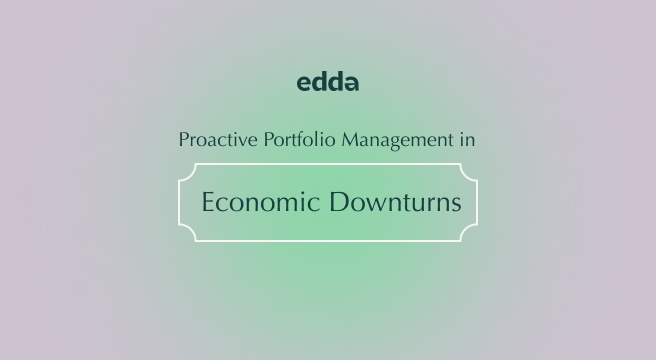Venture Capital (VC) and private equity firms have a long-standing tradition of identifying investment opportunities in economic downturns. During such challenging times, proactive portfolio management becomes crucial for helping portfolio companies navigate financial hurdles while simultaneously capitalizing on unique opportunities that may arise.
In this context, Edda (formerly Kushim), a state-of-the-art portfolio tracking software, comes to the forefront. This article elaborates on the significance of effective portfolio management during economic downturns and how VC firms can optimize their approach for success. In addition, discover how Edda’s venture capital portfolio management software can be a major asset to your firm.
Comparing VC Portfolio Management Approaches
In challenging economic times, the approach to portfolio management can fundamentally determine a venture capital firm’s success. Two common approaches are project portfolio management and lean portfolio management.
Project Portfolio Management
Project portfolio management emphasizes the development of well-structured project plans executed by temporary teams. The scope extends to the entirety of the business, emphasizing expected growth, changes in team composition, project prioritization, and system methodology. In the context of venture capital, this could mean planning for each portfolio company’s development, defining timelines, and allocating resources.
Lean Portfolio Management
On the other hand, lean portfolio management aims at streamlining the process by combining loosely structured value opportunities with a durable team-of-teams organizational model. In the venture capital world, this involves teams defining the work required by portfolio companies and focusing on current tasks over future growth.
Venture Capitalists (VCs) can determine the portfolio management strategy to adopt based on several factors:
Nature of the Portfolio Companies
The type of companies in the portfolio can influence the choice of strategy. For instance, if a portfolio includes early-stage startups that need to grow quickly, a project portfolio management approach might be more appropriate. It allows for meticulous planning, which can be especially helpful in these high-risk, high-reward situations. In contrast, if the portfolio consists of mature companies, a lean portfolio management approach could be more suitable as it focuses on efficiency and streamlining processes.
Size and Complexity of the Portfolio
Larger portfolios with a diverse set of companies may require the structured approach of project portfolio management to effectively monitor and manage each investment. Conversely, smaller or less diverse portfolios may benefit from the agility of lean portfolio management.
The VC Firm’s Expertise and Resources
The firm’s human and financial resources, as well as its expertise and experience, can dictate the approach. A VC firm with abundant resources and extensive experience might lean towards project portfolio management as it involves significant planning and control. On the other hand, lean portfolio management may be a better fit for firms with limited resources or less experience, as it emphasizes flexibility and efficiency.
Market Conditions
Economic circumstances and market trends can also affect the choice of strategy. For example, in a volatile market, the structured approach of project portfolio management could help mitigate risks, while in a stable market, lean portfolio management might be sufficient.
Investment Horizon
The time horizon for returns on the investments can influence the strategy as well. If the firm seeks quicker returns, they may opt for lean portfolio management to swiftly capitalize on opportunities. Conversely, if the firm has a longer investment horizon, project portfolio management may be more suitable to ensure thorough planning and execution.
In the end, the choice between project portfolio management and lean portfolio management isn’t binary. Many VC firms use a blend of both approaches, adjusting their strategy according to the specific needs of their portfolio companies, market conditions, and their own resources and objectives.
Consequences of Poor Venture Capital Portfolio Management
Poor portfolio management can negatively impact the performance of a venture capital firm, potentially leading to its downfall. Here’s how:
Misalignment of Objectives and Goals
A venture capital firm’s goals could range from broad objectives such as growing the firm or increasing ROI, to more intricate long-term goals like expanding into new sectors or nurturing multi-faceted startups. Poor portfolio management can result in these goals not aligning with the objectives, leading to diluted efforts.
Resource Misallocation
A lack of goal alignment often results in resources being allocated inefficiently. This could mean providing unnecessary tools or resources to portfolio companies that don’t require them or failing to adequately support those that do.
Inadequate Risk Management
Failing to properly identify risks is another consequence of poor portfolio management. Without an accurate assessment of potential risks, venture capital firms may not have adequate safety measures in place to mitigate losses.
The Solution: Venture Capital Portfolio Management Software
Venture capital portfolio management software serves as a panacea for the issues facing venture capital firms, including the alignment of goals and objectives, effective resource allocation, risk assessment, and data transparency. The software allows firms to actively monitor and identify any misalignment between their goals and objectives. Consequently, firms can strategically reallocate resources or tweak strategies to ensure alignment with the set goals.
In terms of resource allocation, CRM portfolio management within the software suite aids VC firms in maintaining transparent data about their portfolio companies. This comprehensive data transparency ensures the appropriate distribution of resources to the right projects within the portfolio.
Moreover, the software comes equipped with potent tools for risk management. These tools generate real-time, transparent data, accounting for all potential variables, such as market trends and competitor strategies. This crucial insight allows VC firms to factor in these variables before making any significant investment decisions.
The software’s ability to provide accurate and transparent data enhances decision-making capabilities. Leaders and managers can effectively mitigate risks associated with resource misallocation, project stagnation, and unmet strategic goals due to misunderstood objectives, by utilizing this wealth of data.
Improving VC Portfolio Management
While VC portfolio management software is a significant step in the right direction, it’s not the only solution to ensuring effective portfolio management. Here are some strategies you could implement to improve your project portfolio management.
Define and Prioritize Goals: Before you start your portfolio management, define your enterprise’s goals and align them with your business strategies. These goals will serve as your guiding light in decision-making, and setting priorities among them will help in resource allocation.
Assign Ownership: Assign clear roles and responsibilities to your team members. This will reduce ambiguity and improve the accountability of tasks. Remember, a well-structured team is a critical asset in project execution.
Measure Success: Establishing success criteria early on will provide a clear direction for the project. This could include performance metrics like ROI, stakeholder satisfaction, market share, etc. Regularly monitor and evaluate these metrics to ensure the project is on track.
Foster Communication: Regular and transparent communication within the team and with stakeholders can help in mitigating risks, improving team collaboration, and ensuring that everyone is on the same page.
Continuous Learning: Lastly, learn from your mistakes. Implement a system of continuous learning and improvement in your enterprise. This will make your portfolio management more efficient and effective over time.
Streamlining Portfolio Management with Edda
What is the best software for investment portfolio management?
Edda’s robust toolset serves as a potent enabler for effective portfolio management, particularly during economic downturns. It offers a comprehensive suite that assists investors in syncing objectives with goals, optimizing resource allocation for projects, managing risks via effective communication, and delivering accurate, transparent data.
Harmonizing Objectives with Goals: Edda’s potent analytics allow investors to keep a real-time pulse on the performance of their portfolio companies. This real-time monitoring allows for the detection of any divergence between objectives and goals, followed by swift course correction to realign them.
Optimizing Resource Allocation for Projects: With a bird’s eye view of the resource allocation across each portfolio company, provided by Edda’s software venture capital platform, investors can swiftly identify and rectify any potential misallocation. This ensures each project is appropriately equipped with the necessary resources for its success.
Risk Management through Effective Communication: Edda fosters open channels of communication with portfolio companies, enabling a proactive approach to risk management. Access to real-time data allows for the consideration of all possible variables, including market trends and competitive strategies.
Delivering Transparent Data Accurately and Efficiently: Edda’s venture capital management software offers access to accurate, transparent data on-demand. This transparency effectively mitigates potential issues arising from inaccurate data or lack of visibility, such as misallocation of resources or misalignment between goals and objectives.
In economically challenging times, the significance of proactive portfolio management skyrockets. By dynamically blending elements of project and lean portfolio management based on situational demands, VC firms can offer much-needed support to their portfolio companies.
In this mission, portfolio management tools like Edda prove to be invaluable allies, fostering transparency, risk management efficiency, and optimal resource allocation. With the support of these capabilities, investors are better equipped to navigate their portfolio companies through economic upheavals.









